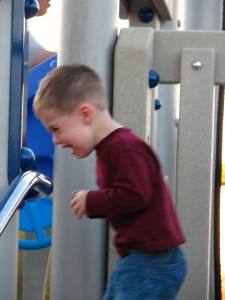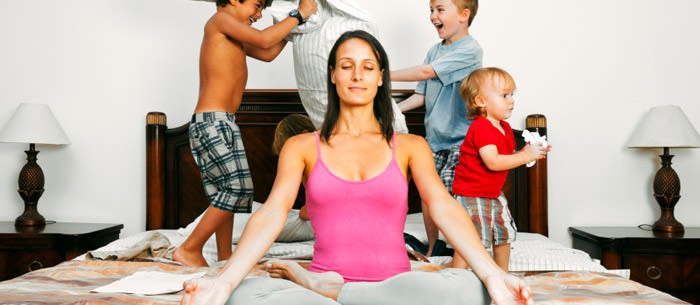Natural Consequences Challenge 2
This month’s parenting challenge is to let your child learn from natural consequences as much as feasible.
Natural consequences are one of the best ways to discipline children. It works because it’s real life.
However, this is easier said than done. There are many ways in which a parent can sabotage a lesson in natural consequences. They are:
- rescuing the child
- lecturing the child
- getting angry with the child
Rescuing
What I mean by rescuing a child is taking some of the responsibility, not following through or not letting the natural consequence occur. For example:
- Your child waits until 9 PM to start writing her 10 page paper; rescuing would be helping her in some way: typing it for her if you can type faster or letting her stay home sick from school
- Your child spills water all over the floor; rescuing would be you cleaning up the mess, not him
- Your child looses a toy or they break it (on purpose); rescuing would be buying them a new toy
Lecturing and Anger
Lecturing or getting angry with your child about a bad choice takes the attention off of them and puts in on you as a parent. Children will often times stop listening and tune out. They are no longer thinking about what choice they made and the consequence, but rather on how annoying their parent is.
Use Discretion
Obviously, if your child is going to get majorly hurt than you will need to rescue them (like trying to jump off the roof). However, a little hurt to the body or pride is alright.
Examples:
- your child makes a mess; consequence = they clean it up
- your child jumps on a bed; consequence = they bonk their head
- your child takes a toy somewhere outside the house and they loose it or it breaks; consequence = they no longer have the toy to play with
- your children don’t sort their clothes in the laundry when asked; consequence = they don’t have any clean clothes to wear
- your child doesn’t complete their homework; consequence = a consequence at school
It can sometimes be hard to think of a natural consequence at the exact moment you need it (if it doesn’t happen naturally), so I like to take a couple of seconds and think about what I would have to do or what would happen to me if I were in the child’s position.
Personal Story
We were visiting my dad for the Fourth of July. Our room set up was a blow up mattress and bunk beds for the kids. We explained to the kids that it probably would not be a smart idea to jump on the mattress. We asked them why and they replied, “because you may fall off and bonk your head.” The next day we hear some crying from the bedroom. Our three year old daughter comes out holding her head. She told us that she bonked her head on the bed because she was “jumping like a kangaroo.” I gave her a hug and a kiss and told her I was so sorry (and I meant it, I wasn’t sarcastic). When it was time to go to bed, she pointed at the mattress and said, “I no jump on dere no mo, I bonk my head, it hurt and I cried.” We simply replied, “I’m so glad I didn’t jump on there, I don’t want my head to hurt.” Sure enough, she did not jump on the mattress for the rest of our visit, however, she had a nice little bruise on her head.
[amazon_enhanced asin=”1930429002″ /] [amazon_enhanced asin=”1576839540″ /] [amazon_enhanced asin=”1930429487″ /]
[amazon_enhanced asin=”1424156963″ /]
read my review here.
Difficult
When using natural consequences, one of the hardest things for me is not always seeing an intimidate result. Many times natural consequences aren’t felt until the next time they come around. Staying consistent is key.
Challenges:
Week 1: Brainstorm ideas of natural consequences and when you could apply them. If any of them come up this week, try them out.
Week 2: Think of something about parenting that usually causes you stress. Brainstorm ideas of natural consequences that could help you teach your child and take away some of your stress. Apply these consequences this week. (In the comments below, share some of the natural consequences your children had to endure this week!)




Comments
*This week we had a discussion with our 7 year old about sliding in his school uniform pants. We told him that if he didn’t stop and he tore a hole in them, that he would have to buy the replacement pair. We told him the pants were $20. The next day he was asking us how many quarters it would take to have $20. We turned it into a math lesson and asked him how many quarters were in $10. I think he might have been thinking about how many chores it would take to earn $20!
*My daughter was the last one out of the house and the door was still open. I had her get out of her car seat and go back and close the door. She has pointed out to me every time she’s shut the door since.
*My two year old spilled water, so he got a kitchen towel and cleaned it up. He had to be reminded to hang the towel back up when he was done.
*My daughter forgot to turn off the light in her room. I noticed as I was backing up in the car that her light was still on. I pulled back into the drive way, had her get out, go in and turn it off. She grunted in frustration and said “Not again.”
All of these things took much more time, than if I would have just taken the responsibility upon myself to fix them. However, I would have been doing my children and myself a disservice. It takes time in the beginning, but later on, we will reap the benefits of know that the kids can take responsibility for it!